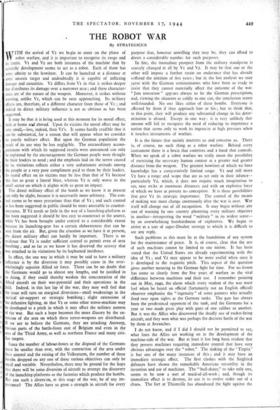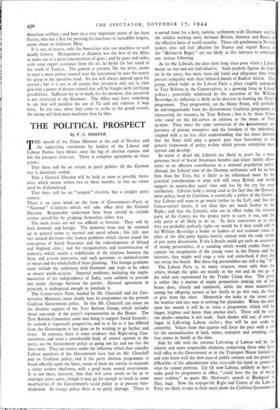THE ROBOT WAR
By STRATEGICUS
WITH the arrival of V2 we begin to enter on the phase of robot warfare, and it is important to recognise its range and .ts limits. VI and V2 are both instances of the machine that by sjentific development seems to act as a robot. Each of them has ,ome affinity to the howitzer. It can be launched at a distance at some unseen target and undoubtedly it is capable of inflicting damage and casualties. V2 differs from Vr in that it strikes deeper but distributes its damage over a narrower area ; and these character= istics are of the nature of the weapon. Moreover, it strikes without warning, unlike Vt, which can be seen approaching. Its military effects are, therefore, of a different character from those of VI ; and indeed its direct military influence is not as obvious as has been suggested.
It may be that it is being used at this moment for its moral effect, both at home and abroad. Upon its victims the moral effect may be very small,—less, indeed, than VI's. It seems hardly credible that it can be substantial, for a reason that will appear when we consider its purely military effect. But upon the German population the result of its use may be less negligible. The extraordinary accom- paniment with which its supposed results were announced can only be explained by the encouragement the German people were thought by their leaders to need ; and the emphasis laid on the terror caused by its visitations reflects either a very unfortunate attitude among the people or a very poor compliment paid to them by their leaders. Its moral effect on its victims may be less than that of Vi because this has so great a lateral blast, whereas V2 is only worse in the small sector on which it alights with so great an impact.
The direct military effect of the bomb as we know it at present can only be slight, because it is necessarily more arbitrary. The con- trol seems to be more precarious than that of VI ; and such control as has been suggested in public should be more amenable to counter- measures. If V2 needs so little in the way of a launching-platform as has been suggested it should be less easy to counteract at the source, while VI has been brought under control to a considerable extent because its launching-gear has a certain elaborateness that can be seen from the air. But, given the situation as we have it at present, the direct military effect can hardly be important. There is no evidence that V2 is under sufficient control to permit even of area bombing ; and so far as we know it has deserved the secrecy that was attached to its visitations by its haphazard incidence.
In effect, the one way in which it may be said to have a military influence is by the diversion it may possibly cause in the over- whelmingly superior Allied air force. There can be no doubt that the Germans would go to almost any lengths, and be justified in so doing, if they could thereby weaken the concentration of the Allied aircraft on their war-potential and their operations in the field. Indeed, in this last lap of the war, they may well feel that the issue will turn on marginal diversions—small weakenings in the tactical air-support or strategic bombing ; slight extensions of the defensive fighting, sb that V2 or some other terror-machine may be developed to a pitch in which it may affect the military- pattern of the war. But such a hope becomes the more illusory by the ex- tension of the area on which these terror-weapons are distributed. If we are to believe the Germans, they are attacking Antwerp, various parts of the battle-front east of Belgium and even in the area of the Third Army, as well as northern France and many civi- lian targets.
Since the number of labour-hours at the disposal of the Germans must be smaller than ever, with the contraction of the area under their control and the raising of the Volkssturm, the number of these bombs dropped on any one of these various objectives can only be small and variable. Nevertheless, there may be ground for the hope that there will be some diversion of aircraft to attempt the discovery of the launching-platforms or the factories which produce the bombs. But can such a divers:on, at this stage of the war, be of any im- portance? The Allies have so great a strength in aircraft for every
purpose that, however unwilling they may be, they can afford to divert a considerable number for such purposes.
In fine, the immediate prospect from the military standpoint is scarcely changed at all by VI and V2. It may be that one or the other will impose a further strain on endurance that has already suffered the attrition of five years ; but in the last analysis we may agree with the German commentators who have been so ready to insist that they cannot materially affect the outcome of the war. " Jam tomorrow " appears always to be the German prescription, and, viewing the situation as coldly as one can, the conclusion seems well-founded. No one likes either of these bombs. Everyone is affected by them if they approach him or his ; but to think that, at this point, they will produce any substantial change in his deter- mination is absurd. Except in one way : it is very unlikely that anyone will fail to recognise the need of reducing to impotence a nation that seems only to work its ingenuity at high pressure when it touches instruments of warfare.
It is the future that mainly interests us and concerns us. There is, of course, no such thing as a robot warfare. Behind every instrument there is a brain that contrives and a hand that controls. When we speak of a robot warfare we really mean the possibility of exercising the necessary human controi at a greater and greater distance from the weapon. The greatest howitzer of which we have knowledge has a comparatively limited range. VI and still more V2 have a range and scope that are as yet only in their infancy— particularly V2, which, it does not require much imagination to see, may strike at enormous distances and with an explosive force of which we have at present no conception. It is these possibilities that give V2 its strategic importance. The control of the means of making war must change enormously after the war is over. War itself will change out of all recognition. It may begin without any sort of warning by one country plastering every military objective in another—interpreting the word " military " in its widest sense— by an overwhelming bombardment of explosives. We begin to arrive at a sort of super-Douhet strategy to which it is difficult to see any reply.
Such problems as this must lie at the foundation of any system for the maintenance of peace. It is, of course, clear that the use of such machines cannot be limited to one nation. It has been stated that the United States are already experimenting with the idea of Vi ; and V2 may appear to be more useful when once it is developed to the requisite pitch. This aspect of the question gives another meaning to the German fight for time. For no lesson has come so clearly from the five years of warfare as the vital difference between machines and their use. I remember pointing out in May, 194o, the alarm which every student of the war must feel when he heard an official (fortunately not an English official) observer emphasise the " ingenuity " of some gunners who actually fired over open sights at the German tanks. The gun has always been the predestined opponent of the tank, and the Germans for a year or two made great play with guns of one calibre or another. But it was the Allies who discovered the deadly use of rocket-firing aircraft, and they won what was perhaps the decisive battle of the war by them at Avranches.
I do not know, and if I did I should not be permitted to say, what lines the Allies are working on in the development of the machine-side of the war. But at least it has long been evident that they possess machines requiring immediate control that have very obvious advantages over the "robot." The sinking of the Tirpitz is but one of the many instances of this ; and it may have an immediate strategic effect. The first clashes with the Siegfried defences have shown the remarkable American versatility in the invention and use of machines. The " bull-dozer," to take only one, seems to be now a sort of maid-of-all-work ; and, though its immediate effect is to destroy, its use is to evolve order out of a chaos. The fort at Thionville has abandoned the fight against the American artillery ; and here on a very important sector of the front Patton, who has a flair for pressing his machines to incredible lengths, seems about to eliminate Metz.
It is not, of course, only the Americans who use machines in such deadly fashion. Montgomery at Alamein was the first of the Allies to make use of a great concentration of guns ; and by guns and tanks, with some expert assistance from the air, he broke the last stand in the south of Tunisia. The general at present, like the artist, seems to exert a more perfect control over the instrument he uses the nearer his grasp to the operative head. Its use will always depend upon his control ; but it is not at all certain that invention may not in time give him a power of distant control that will be fraught with terrifying possibilities. Sufficient for us to mark, for the moment, that invention is not restricted to the Germans. The Allies may have something to say that will paralyse the use of V2 and any relatives it may have. In any case, when they come to strike in the grand assault, the enemy will find more machines than he likes.



























 Previous page
Previous page